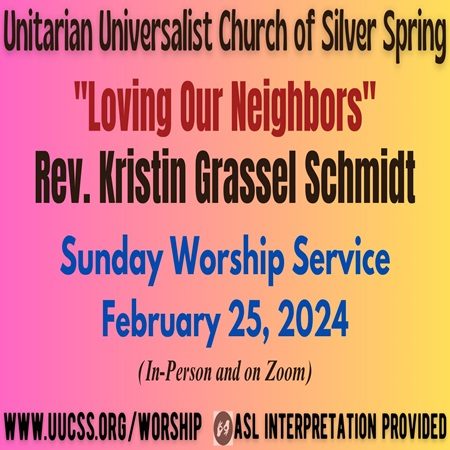Think for a moment about the purpose of working with others in the community. Changing policies, changing laws, changing the budget may come to mind. But in 1956, after the U.S. Supreme Court struck down bus segregation, here’s what the Rev. Dr. Martin Luther King Jr. said was his end-goal for the Civil Rights Movement:
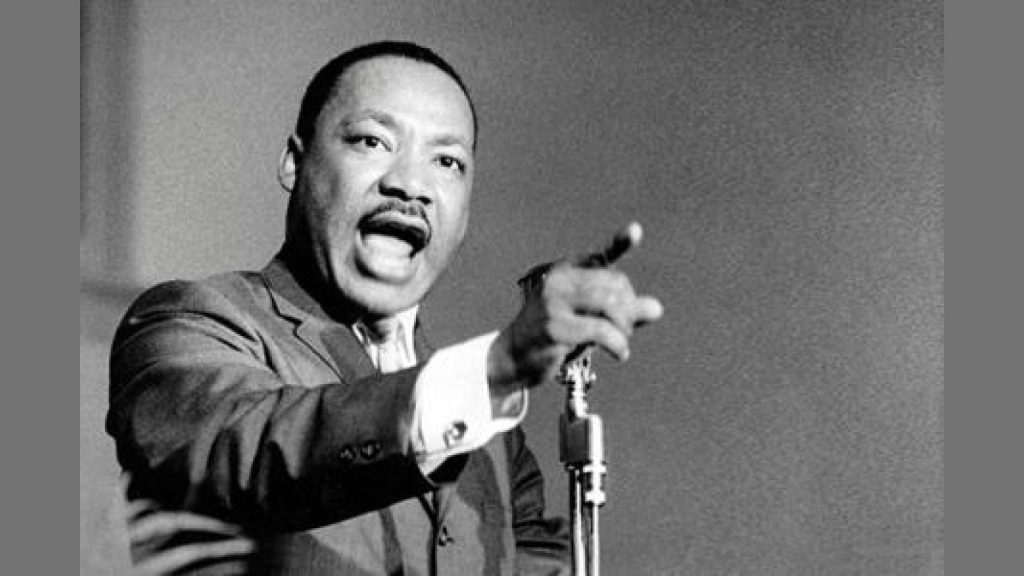
“The end is reconciliation; the end is redemption; the end is the creation of Beloved Community. It is this type of spirit and this type of love that can transform opponents into friends. It is this type of understanding goodwill that will transform the deep gloom of the old age into the exuberant gladness of the new age. It is this love which will bring about miracles…”

Beloved Community, the concept of a world community where all share in the earth’s gifts, was first coined by American philosopher, Josiah Royce. Royce founded the Fellowship of Reconciliation, this country’s oldest interfaith organization, and it was there that Dr. King first encountered the concept that would inspire so much of his public ministry. It has also come to be a guiding vision for our liberal faith.
While the Beloved Community can be glimpsed in small pockets in the world and our lives, it’s a future-oriented vision we can experience now only when we put it into practice. The Beloved Community is made real when we interact and live in ways that nurture the flourishing of all life. This doesn’t mean an absence of conflict, but a reality where conflict doesn’t derail reconciliation.

It isn’t any single congregation or group of friends, neighborhood, state, or country – though it can be experienced in all of those contexts. And it’s definitely not “a community of like-minded people.” Beloved Community is exactly the opposite: people who may not like-minded about all sorts of things, but who grow in friendship and find ways to serve the goals they do share.
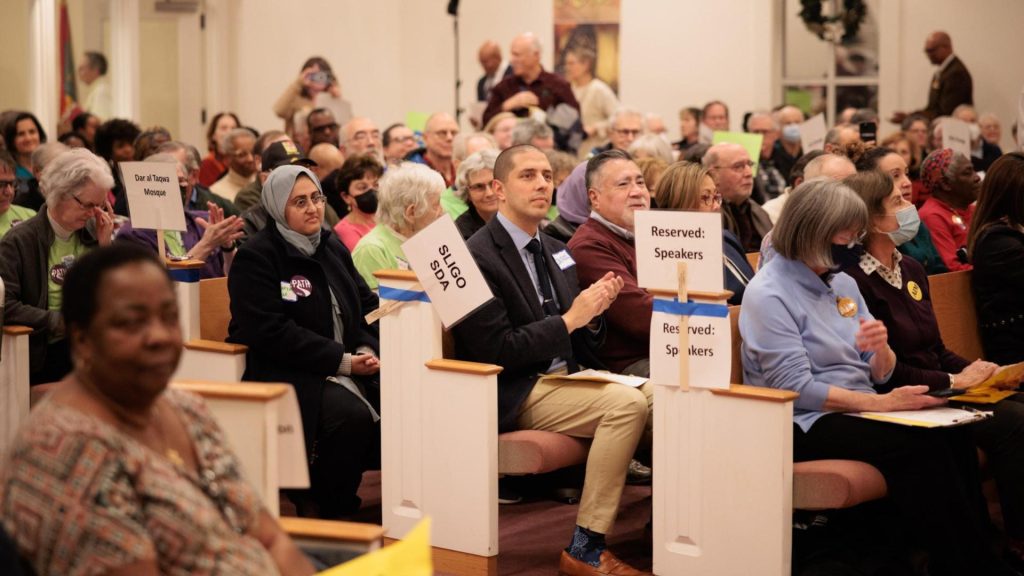
Though we didn’t include the phrase explicitly, Beloved Community is woven into our congregation’s vision. After revitalizing our Religious Education ministry, you all identified two other priorities for our vision UUCSS: growing in relationship with our neighbors, and working with local partners to advocate for mutual liberation.
Both of these are key parts to building the Beloved Community. And I can think of no better organization for us to partner with to do this important and transformational work than Action in Montgomery, usually referred to as “AIM.”

Established in 2000, AIM is a community power organization rooted in neighborhoods and congregations. Every action that AIM’s members choose to take together begins with listening sessions like the one we just did, where people are invited to share their own stories and concerns.
Listening sessions happen in people’s homes, in congregations, at schools and workplaces, and now on Zoom, with people from all corners of the community. They are a way to build power and unite people from diverse perspectives and cultures, religious beliefs and cultural norms around the things they can work on together.
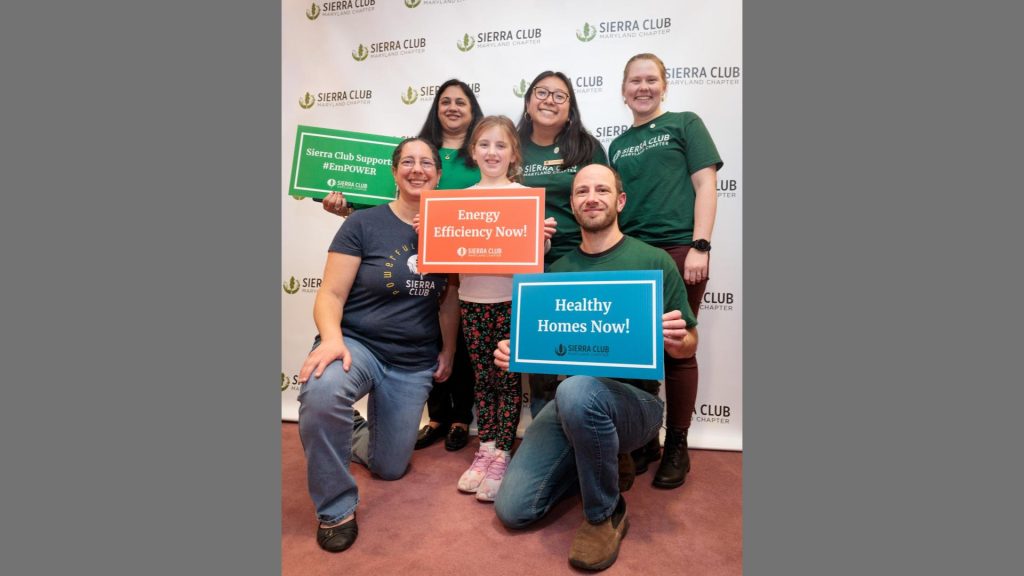
It’s these listening sessions that help AIM identify which actions it will take in the community. In this way, everyone involved in AIM connects their own personal experience with the work to be done. It’s out of those listening sessions that AIM chooses which actions it will take, as a way to help life to flourish, and as a way to help people know they are not, in fact, powerless. And AIM has demonstrated again and again that its members are anything but powerless.
In the last 16 years, AIM members have organized to create over $660 million of affordable housing stock in the Housing Initiative Fund. Several years ago, over 1000 AIM members showed up at a county council meeting where they were successful in getting all council members to unanimously overrule a budget so that the $30 million County Executive Legget had initially promised was actually allocated to renovate community centers in historically African American neighborhoods.
AIM’s past work has been Montgomery County-focused, but this year AIM has partnered with the Sierra Club, PATH (People Acting Together in Howard Co.), and Interfaith Power and Light on a multi-year state-wide initiative for housing equity, tenants’ rights, and climate justice. Just imagine how many people AIM will be able to mobilize to show up at the statehouse to fight for Inflation Reduction Act funds to be used equitably here in Maryland. Just imagine how UUCSS could help people’s lives flourish by working with AIM to fight for more affordable housing, climate and health-conscious upgrades for residential renters, and the creation of local, good-paying jobs to support this work.
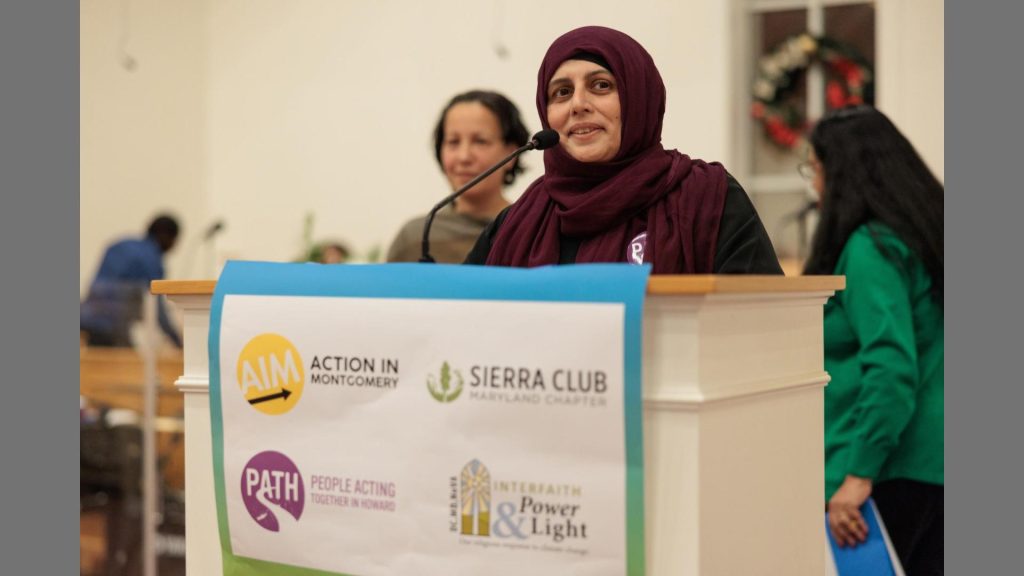
AIM’s community organizing model is set up to center the voices of people often marginalized by our society and economy. Its model also creates ongoing opportunities for its members to grow in relationship with neighboring congregations across religions, cultures, races, and socio-economics, the kind of relationships you all included in our new vision.

We know UUCSS can’t live into that shared vision all by ourselves. Because building the Beloved Community is something that only happens when we transcend barriers, when we celebrate diversity, when we work for the common good so that all life can flourish.
It’s easy to feel powerless when faced with the world’s problems. And those with the most wealth and power benefit when we think we have to face our problems as individuals. But we are not just individuals. We are members of communities, and as members of communities we have power. As we heard in our Time for All Ages today, we are indeed more together than we are alone; the weight of that last single snowflake can make the difference so barriers to justice and freedom can finally be broken.
But in order to be more together, we need to be willing to invest some of our time, skills, energy, and some of our congregation’s money to make it happen. UUCSS has power, but right now we spread it thin across many different organizations and issues. But our power as a whole congregation could have a much bigger impact if we were to focus it in partnership with one organization, an organization with a long history of success on issues important to us as Unitarian Universalists.
I could talk all day about the ways AIM helps congregations like ours use their power in impactful ways. But Ms. Djamila Bah is here, and she can tell you firsthand how being part of AIM has helped her move into her power and helped her to flourish. Please, won’t you join me in welcoming Ms. Djamila to the pulpit?
Djamila Bah
Good morning. My name is Djamila Bah and I live in Montgomery Village. I’m a mother of an 11 year old son who attends public school. I’m originally from Guinea in West Africa and was raised by my grandmother who was a French expat.
My grandmother fell in love with my grandfather who at the time was in France studying on scholarship (and doing some boxing on the side to earn some cash). They moved to Guinea which became my grandmother’s adopted country. I come from a family who crosses boundaries of faith, of geography, of race.
My son attended a Title 1 elementary school that had problems with the building and that’s how I got involved with Action in Montgomery. Because I wanted a better life for him. After several years of being delayed, we worked together to win the funding to build a new school. The children who attend the school now do not have leaking roofs, they have heat when it’s cold so they don’t have to take exams wearing coats and gloves, they have bathrooms that work. It took congregations and communities coming together to put enough pressure on our elected officials to get a new school. We did it.
In addition to the local county-level work, we have been working on statewide campaigns. Many of our congregations have members who live in other counties. This past fall, I joined a team doing NO2 testing in gas-powered kitchens. According to the Environmental Project Agency, exposure to NO2 levels at 100 parts per billion is unsafe when we are OUTDOORS. Decades of research show that it leads to asthma and other illnesses.
But we were measuring NO2 levels at three times that rate INDOORS. We measured in single family homes where at least there were options to open windows and turn on vents. But we also measured in apartments where those were not an option. We saw the level and we had to do something about it
As a result, we have been working statewide in partnership to pass legislation in Annapolis that would give all Maryland residents an affordable option to switch to cleaner sources of energy. The more I go into the community, the more it’s pushing me to be part of change.
This work and the way we do this work focuses on everyday people like you and me and it lifts up our voices as experts of our experience. I work to change systems so that we all can have access to better health, better housing, cleaner air, better education.
I hope all of you will join me, too. Thank you.
Bob Geiger
[Rev. Kristin] And now I’d like to invite forward UUCSS member Bob Geiger, who’s going to share a few words with us.
So, good morning, thank you reverend Kristin. I’m Bob Geiger, I lead the Defending Democracy group here at UUCSS. And I also am the principle at New Hampshire Estates Elementary School. New Hampshire Estates is a partner of AIM.
The day I first visited New Hampshire Estates Elementary School, over 25 years ago, I went to a schoolwide meeting in the gym. There were kids and staff of all different races who had grown up speaking many different languages enjoying each other and singing the school song about “friends from many lands” who “learn to all join hands.” This place, I felt, was embodying hope for the world. It reflected the future we could build, we needed to build, for all of us to survive and to thrive. It was, although I did not have the words then, the beloved community.
I felt the same way when I went to my first Action in Montgomery meeting, and I still feel that way whenever I go to an AIM meeting. AIM reflects the beautiful diversity of this area that we live in. There are mothers speaking Spanish, women in head scarves, black Christian ministers, Catholics, Presbyterians, Unitarian Universalists, Seventh-Day Adventists, Quakers, Muslims and Jews, young parents and senior citizens, well-off and well-educated professionals, and recent immigrants with much in the way of spirit but without much in the way of monetary wealth. All of these folks are building relationships, speaking their minds, and working together to help make their community and their world a better and more just place. It is the beloved community.
This is also what democracy looks like, beyond simply voting. It is real distribution of political power and participation in the civic life of the community. For democracy to work, for it to hold amid the chaos that will come, we need resilient civic institutions, organized political action at all levels, the building of bonds across the identity of group or tribe. This is what AIM does, better, more broadly and deeply, more intentionally, than any other organization I know.
I got to know AIM because they were instrumental in bringing an after-school program to our school. It is a great program for our kids and our families. It runs from right after school until 6 p.m., Monday through Friday. Kids do some studying, but it is mostly enrichment activities – arts and crafts, yoga, exercise. It is free, paid for by the county. It is fantastic for our working families that struggle to find and afford child care. The program was AIM’s idea, similar to a program that a sister organization helped create in Baltimore. AIM organized our parents and brought the case to the county council. AIM can turn out 1,000 members for a candidate forum, so the politicians listened and acted.
I want to leave you with a story from that organizing campaign during my early years as a principal. We had a kindergarten student named Galilea. She was a spirited girl, but lacking in self-confidence. Her family spoke Spanish in a society dominated by English and Galilea was born with only one complete arm. Galilea’s mom came to some of our parent coffees and parent events about the after-school program. AIM was looking for a parent willing to speak to the county executive at a budget meeting about the difference that an after-school program would make for our community. Galilea’s mom did not speak much English. She was not a born leader. But she was willing to speak at the budget meeting. I remember going with Galilea and her mom and an AIM organizer to the budget meeting. Galilea’s mom got up and spoke her piece in Spanish. It was translated for County Executive Ike Leggett and the rest of the crowd. Her heartfelt words helped us get the after-school program. Galilea was there to see it. Galilea was smiling afterward. She was proud of her mom, who had shown that she could do big things. Neither Galilea nor her mom would not soon forget that night.
That is what AIM does. It empowers people.

